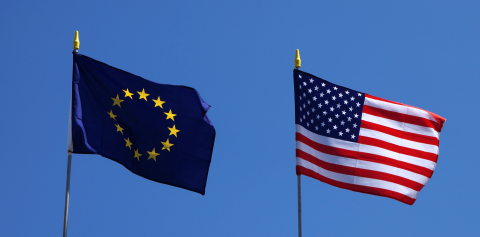Strengthening Transatlantic Ties: The Case for an EU-US Mutual Recognition Agreement on Conformity Assessment
26 January 2024

On January 30, the European Union and the United States will reconvene the Trade and Technology Council (TTC) to continue advancing shared transatlantic trade priorities. In the midst of a fundamental global geopolitical realignment, the TTC remains a critical forum to elevate and deepen the level of transatlantic cooperation.
Ahead of the meeting, Orgalim, representing Europe’s technology industries, urges EU and US policymakers to proceed with negotiations on a Mutual Recognition Agreement (MRA) on Conformity Assessment. The MRA should cover machinery and electrical equipment, alongside other relevant product categories to ensure balanced benefits on both sides of the Atlantic. This move would significantly reduce barriers to trade, streamline processes, and cut costs for industrial sectors that are critical to the net-zero transition and future economic resilience on both sides of the Atlantic.
With EU-US trade in machinery and electrical equipment amounting to more than Є176 billion annually – nearly three times more than trade in vehicles – this is a pillar of the transatlantic trade relationship. Yet the market is held back because manufacturers face the challenge of conforming to diverse market standards when exporting their products. To ensure conformity, they often have to rely on Conformity Assessment Bodies (CABs) from the importing country to certify their compliance. This leads to increased costs, prolonged waiting times, and language barriers. Orgalim's proposal for an MRA seeks to alleviate these challenges by allowing exporting companies to use CABs in their home market for certification, boosting efficiencies and cost-effectiveness.
In the words of Malte Lohan, Orgalim’s Director General, "An EU-US Mutual Recognition Agreement on Conformity Assessment is a pragmatic solution to enhance trade efficiency, reduce costs, and strengthen transatlantic ties."
An EU-US Mutual Recognition Agreement on Conformity Assessment is a pragmatic solution to enhance trade efficiency, reduce costs, and strengthen transatlantic ties.
The benefits of such an agreement are clear. A forthcoming study, on the economic impact of an EU-US MRA on Conformity Assessment, commissioned by a group of Orgalim member associations and conducted by the EU think tank ECIPE, projects that EU exports to the U.S. in these high-tech, future-facing sectors could experience a substantial increase of up to Є38.5 billion. U.S. exports to the EU would increase by up to Є30 billion, an even bigger increase in relative terms. Meanwhile, China's exports to both markets would be expected to see a corresponding decline in these sectors, ranging from Є6.5 billion to Є17.5 billion.
In today’s challenging geopolitical environment, high-tech manufacturing companies are looking to the transatlantic partnership to deliver tangible results. The proposed EU-US MRA on Conformity Assessment doesn't just represent a strategic opportunity for the TTC to take concrete steps in reducing trade barriers; it serves as a cornerstone for a stronger, cleaner and more resilient transatlantic industrial base.

LATEST NEWS
How can we create a dynamic, competitive European high-tech manufacturing base?
Orgalim's key recommendations offer policymake...
